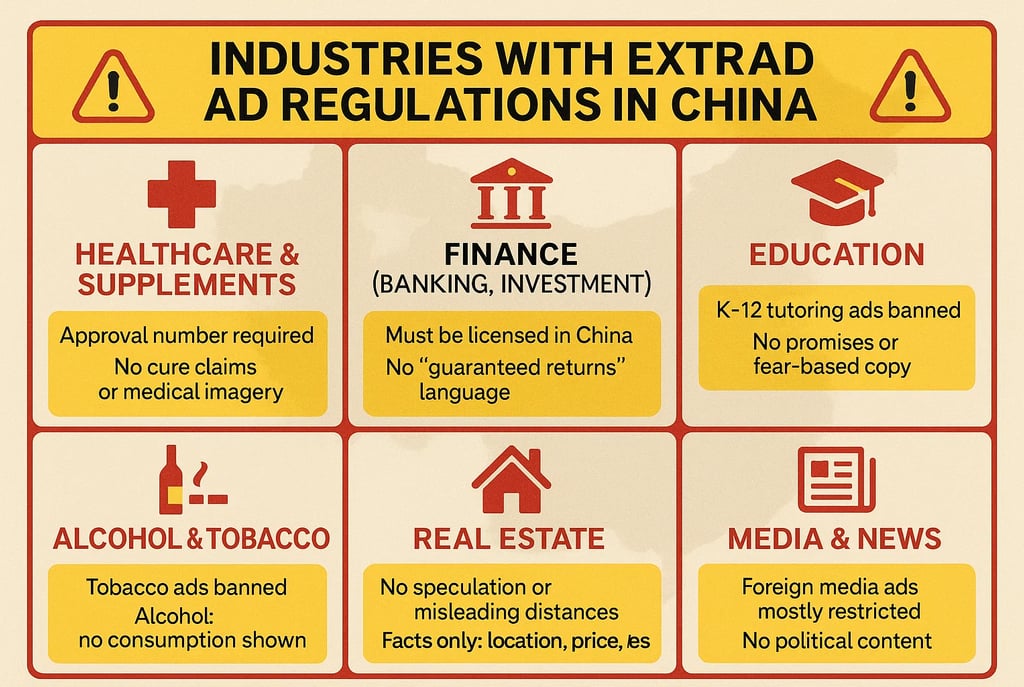How to Run Baidu and WeChat Ads Without a Chinese Entity ?
Foreign companies can run digital ads in China without a local entity using agencies or platform programs. Learn legal steps and industry risks.
Kenneth Ngai
11/10/20254 min read


TL;DR: Foreign companies without a business registration in China can legally run digital advertising campaigns through local agencies, platform-specific international programs, or cross-border solutions. Platforms like Baidu, Tencent, and Alibaba support foreign advertisers with identity verification and compliance checks. However, industries like healthcare, finance, and education face extra regulation.
Legal Requirements for Advertising in China as a Foreign Company
Foreign companies are held to the same legal standards as local ones under China's Advertising Law. This includes:
Truthful content only: Ads must not contain exaggerations, unverified claims, or sensitive content.
Mandatory identity verification: Platforms like Baidu and WeChat must verify business credentials before running ads.
Localized messaging: Content must follow Chinese cultural norms and avoid forbidden phrases or imagery.
Violations can lead to fines up to RMB 1,000,000, ad takedowns, or even blacklisting. For content tips, check our guide to ad copy in China.
How to Advertise in China Without a Local Entity
1. Work Through a Licensed Local Agency
Use a Baidu or Tencent-certified agency to act as your legal proxy.
Agencies manage document submissions, payments, and campaign execution.
Foreign businesses retain creative control and fund the campaigns.
See how this applies when opening a Baidu Ads account without a Chinese business license.
2. Use Platform International Channels
Baidu International (Hong Kong): Accepts foreign business credentials and payments.
Tencent Global Ads: Allows WeChat advertising with overseas-registered Official Accounts.
Platforms assist with onboarding, but identity and content checks still apply.
If you're unsure where to start, check out our Baidu Ads service overview.
3. Partner with a Local Distributor or Reseller
Distributors with a Chinese business license can run ads on your behalf.
Useful in regulated industries like healthcare or finance.
4. Launch a Tmall Global or Alibaba Presence
Tmall Global lets foreign brands sell and advertise via cross-border e-commerce.
Requires trademark verification and deposit but avoids the need for a Chinese entity.
Platform-Specific Policies and Requirements
Baidu (Search Engine Advertising)
Account setup via local agency or Baidu HK office.
Requires translated business license, bank statement, landing page in Chinese.
Minimum deposit of ~RMB 7,000, plus annual verification fee.
Additional documentation needed for healthcare, finance, education, and other restricted sectors.
Ads undergo rigorous pre-approval; medical and supplement ads need government ad approval numbers.
Content must avoid banned phrases, political sensitivities, or exaggerated claims.
For detailed requirements, see our 2025 Baidu Ads setup guide and beginner's guide to Baidu advertising.
Tencent / WeChat
Create a verified WeChat Official Account using overseas business license.
$99 USD annual verification fee for overseas entities.
Permissions to run ads are granted case-by-case.
Ad types include WeChat Moments and banner ads.
Landing pages must be accessible in China; platform discourages links to blocked or slow-loading foreign sites.
Sensitive industries face added scrutiny: health, finance, education, etc.
For account steps, read our WeChat Ads account opening guide.
Alibaba (Tmall, Youku, Alimama)
Only Tmall Global sellers can advertise internally.
Advertising options available via Alimama platform for sellers.
Alibaba.com offers B2B ad tools.
For media channels like Youku, foreign advertisers work via agencies.
Strict content rules, especially for regulated sectors.
Do You Need an ICP License?
Not required for foreign-hosted landing pages.
Required if hosting site on Chinese servers.
ICP filing boosts SEO and improves ad delivery speeds.
Only Chinese-registered companies can apply for ICP filings.
Agencies may provide hosting or ICP workarounds.
Learn more in our dedicated article on ICP licenses in China.
Regulated Industries: What to Watch Out For
Healthcare & Pharmaceuticals
Only OTC products and certified institutions may advertise.
Requires advertisement approval number issued by Chinese health authorities.
Cannot use medical imagery, white coats, or patient endorsements without approval.
Financial Services
Ads must be from licensed institutions.
Investment ads must include disclaimers and avoid guarantee claims.
Crypto-related ads are banned.
Education
For-profit K-12 tutoring ads are banned.
Overseas study ads are permitted but cannot promise results.
Cannot use endorsements from minors.
Media & Entertainment
Foreign news/media websites are blocked and cannot be advertised.
Must avoid politically sensitive content.
Alcohol & Tobacco
Tobacco ads are banned.
Alcohol ads can’t show consumption or imply personal or social benefits.
Real Estate
Property ads must be factual, avoid pricing speculation or misleading location claims.
Overseas property ads must comply with currency and investment regulations.
Government Oversight and Penalties
Regulatory bodies: SAMR, CAC, and sector-specific agencies.
Platforms are liable for ensuring ad compliance and must archive ads.
Penalties: fines, confiscation, public apology, blacklisting, or platform bans.
Enforcement includes public tipoffs, media exposure, and campaign-specific crackdowns.
Best Practices for Foreign Advertisers
Use vetted local partners and platform-certified agencies, like DDS Media Services
Translate and localize all materials for Chinese legal and cultural standards. Our landing page guide for China offers practical design tips.
Pre-review campaigns with agency or legal counsel, especially in sensitive categories.
Keep landing pages accessible and compliant.
Stay updated on changing laws and enforcement cycles.
For Google and Meta alternatives, read how to generate leads in China without Google or Meta.


Conclusion
Advertising in China without a local business registration is achievable but heavily regulated. By working with experienced local agencies, using international platform programs, and staying compliant with sector-specific laws, foreign businesses can reach Chinese consumers via digital ads on Baidu, WeChat, Alibaba, and other channels. For expansion, registering a local entity and securing ICP licenses is the best long-term path.
Are you ready to expand your reach ?
Diversified Digital Strategies
Diversifying your paid media for APAC reach.
Choose DDS Media Services reliable & affordable partner for your Asia expansion strategy.
Connect
Grow
(+31) 644010794
© 2025. All rights reserved.
Pages
